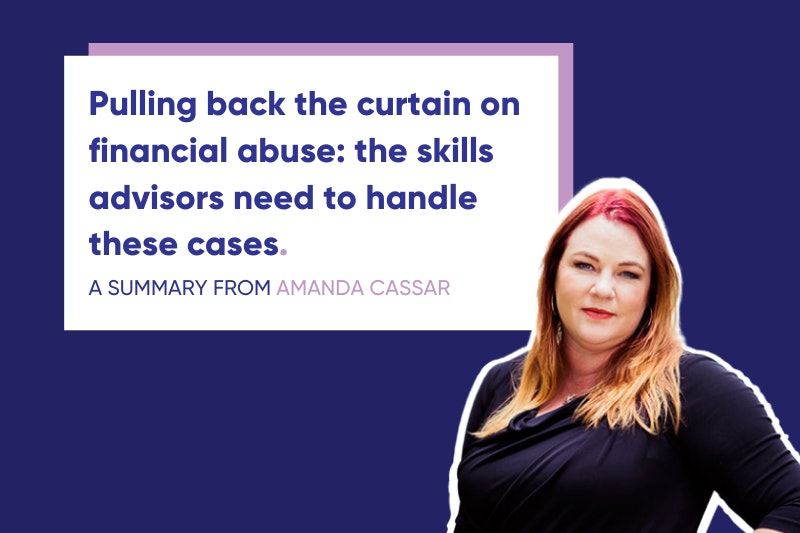Gold Coast based financial adviser Amanda Cassar says ” advisers need skills to handle financial abuse.” Could you confidently recognise a warning sign of financial abuse?
Unfortunately, financial abuse is becoming increasingly more visible on a global scale. It does not discriminate. This type of abuse can occur irrespective of someone’s economic status, level of education, race, gender or ethnicity. It’s important advisors are armed with the particular skillset required to handle cases of financial abuse. Advisers need a different set of skills in their toolkit to handle the rising global cases of financial abuse.
My road to specialising in Financial Abuse
When writing her book, Financial Secrets Revealed, the intention was to explore relationships with money. Cassar wanted to determine whether the lessons we learn in childhood impact decisions we make as adults. Our relationship money can change later in life.
Tanya Targett was one of those interviewed for the book. Targett explained how she had walked into her marriage as a savvy media professional. She was an award-winning journalist, had money in the bank, a home and a trust account. Fast forward a few years, she left the marriage with her daughter. having stashed $20 gift cards to fund groceries. She had a stroke and emotional breakdown after crawling away from her marriage. Tanya was a victim of financial abuse.
But that interview set Cassar on a path of wanting to understand the intricacies of financial abuse. Just how prevalent is it in society and what are the different forms it can take? It was hard to believe as a financial adviser, she had never come across something like this. After a lot of research, it was very apparent advisers fell into two camps. They had either experienced financial abuse first hand with a client or they had had no exposure to it at all.
What is the trigger for financial abuse?
Often there isn’t one defining moment or trigger which leads to financial abuse. It’s more of a ‘frog in the pot’ situation. The pressure is turned up slowly over time and quite often it’s a build up of little moments. And, It is often accompanied by emotional abuse and even domestic violence.
Warning signs of financial abuse
Limiting a partner’s employment options or prohibiting them from progressing is a classic red flag. Some forbid work, or any kind of study or professional development. Targett stated her husband told her to give up the ‘nonsense’ of her successful media career and take a shelf packing job.
Other warning signs can include extreme monitoring of purchases. A spouse may demand to see a receipt for every cent their partner spends or will give a controlled allowance. They likely control and monitor all bank accounts as well. Basically, any severe forms of financial control should raise an immediate flag.
As advisors, one of the first time we ever encounter suspected financial abuse could be in a meeting with a prospect, or long-term client. What if one day, your elderly client walks into your office with their adult child who is requesting all funds be withdrawn. What would you do?
If we look at elder financial abuse, thefts of funds is a big warning sign. It can taking money from the bedside table or large withdrawals from bank accounts. “Inheritance impatience” is another warning sign. Adult children may justify, “well I’m going to get it anyway, I might as well take it now”.
Action steps advisors can take
First and foremost, make sure you are protected by taking down very thorough file notes. Sometimes, it may be nothing more than a gut feeling but over time, if you’ve built up a lot of gut feelings (and file notes), it could be time to have a conversation with the person or couple in which you suspect financial abuse. Or if you’re still unsure, contact a local hotline for direction.
Setting the expectation with couples you work with by explaining you like to work with couples who have a respectful relationship. Explain what a this looks like. A relationship where both parties have the opportunity to voice their opinion, get involved in decision making and have access accounts.
Getting your licensee involved and working closely with them if you have a case that needs to be referred. Hopefully your licensee has a professional standard team and a procedure in place to handle suspected financial abuse. If they don’t, tell them they need to write one. They should have policies and procedures in place to protect you and your business.
Having a list of people you can call. Keep a list of local shelters, the elder abuse hotline, organisations like WIRE in your local state or territory. While not all of these providers will be able to solve the problem, they can point you in the right direction.
It’s not easy calling out financial abuse
It takes a very brave person to call out suspected financial abuse. If you do have a hunch something is going on, you don’t have to deal with it all on your own. Get the right people involved to support you and the victim. Do you feel that you could easily spot and signs? And feel confident that you have the skills to assist?
Cassar believe it’s also very important to make sure your entire team is on board. Make them aware of the warning signs of financial abuse. Your team are often your frontline staff. Making sure they have the confidence to speak up if they suspect untoward activity. What would they do if an adult child popping by reception with a withdrawal form for their parent? They too can be the difference between stopping financial abuse, or unknowingly supporting it.
Finally, don’t think this only happens to certain demographics of people. So, celebrities and professionals are just as susceptible. See the examples of Britney Spears, Mickey Rooney and Tina Turner.
Because advisers are in a powerful but confronting position, they need to not just recognise financial abuse. And, advisers need skills to handle financial abuse. It’s a very delicate topic, but when approached with support and conviction, could save a marriage.
For advisers who would like to learn more about recognising the signs of financial abuse, Amanda has collaborated with Standards International. Together with this UK based firm they have brought the Financial Abuse Specialist accreditation to market.





 January 18, 2025
January 18, 2025 



















